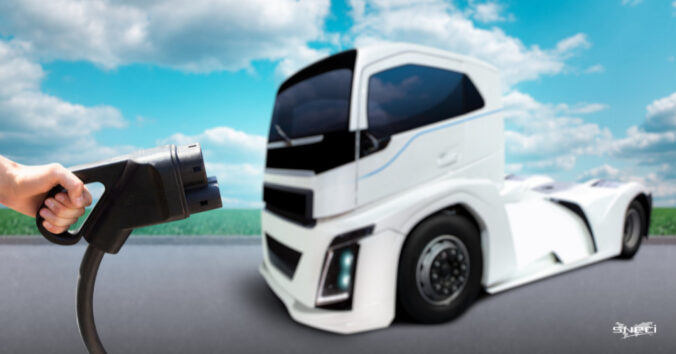The electrification of trucks: a challenge for all transport players

In a world increasingly concerned by global warming and environmental issues, local authorities, companies and car manufacturers are seeking to implement measures to limit their carbon footprint and the road freight sector is more than concerned.
Indeed, the transport sector represents 31% of greenhouse gas emissions (source: L’environnement en France – 2021), and trucks are particularly concerned since in 2019 they were responsible for 22% of emissions. A figure that is constantly increasing.
97% of transport-induced GHG emissions consist of CO2 from the combustion of fuels. Road transport contributes almost all (94%) of emissions from the transport sector. Emissions linked to road traffic fall by 54% to private vehicles, 24% to heavy goods vehicles and 20% to light commercial vehicles. While rail transport emissions are negligible, air transport, domestic and international, attributed to France, represents 4.4% of total French GHG emissions (source https://ree.developpement-durable.gouv.fr/)
The Climate and Resilience Act, which requires the end of thermal power by 2035, also concerns trucks, but the implementation is much more complex than for cars and light vehicles (LCV).
Current situation regarding Trucks’ electrification in Europe
Although the market for electric cars is booming, the Trucks sector is faced with numerous constraints (charging stations, range, price, etc.), making it impossible for electric trucks to gain a foothold both in France and in Europe.
For the time being, there are only a few hundred electric trucks over 16T in Europe, but their number should increase rapidly in order to comply with new regulations and reduce pollutant emissions in the freight transport sector.
In France, there are 680,000 electric vehicles including buses and coaches (which are the most numerous), which represents 6% of the traffic and 2% of the road fleet which is an alarming situation.
Indeed, emissions from the transport sector have increased by 9% between 1990 and 2019 while they have decreased by 28% for all other sectors. Worse still, Trucks alone have seen their GHG emissions increase by 11% over the same period and by 35% for commercial vehicles.
It is becoming increasingly necessary to find solutions to encourage green mobility on the truck side through so-called cleaner or greener energies (electric, hydrogen, natural gas, biofuel, fuel cells), especially since carriers are now obliged to communicate on the CO2 emissions generated by their activity and therefore to be transparent about their environmental impact.
This transparency means that the image of carriers can potentially be impacted and have repercussions on their business.
In France, out of the 305,320 trucks transporting goods as of January 1, 2020, 99% still had a diesel engine, and less than 0.1% of the fleet was electric, which is only about 3,000 vehicles.
The European Automobile Manufacturers’ Association (Acea) estimates that around 10,000 medium-duty electric trucks (3.5 to 16 tons) and 30,000 trucks over 16 tons will be on the road in Europe by 2025, provided that the necessary network of charging points exists. By 2030, the fleet will be 70,000 medium-duty trucks and 200,000 large-duty trucks.
The European Climate Foundation estimates that electric trucks could account for 80% of the market by 2050, since the average emission level of new trucks need to be reduced by 15% by 2025 and by 30% by 2030. Otherwise, violators would be subject to heavy financial penalties.
To comply with the regulatory framework, ACEA estimates that the European fleet will have to include 200,000 electric trucks by 2030, so the industry has no choice but to react quickly.
European manufacturers therefore all have a role to play in enabling the electrification of trucks or their conversion to cleaner energy.
The challenges and benefits of trucks electrification
Electrifying your truck range has many advantages.
The first one, obviously, is the respect of the environment through the reduction of the carbon footprint. Electric trucks produce (almost) no greenhouse gases, the main factor in global warming. Noise pollution is also greatly reduced and air quality is improved.
Electrification is also beneficial for local authorities and the State because it contributes to national energy independence. Indeed, as brands are encouraged to reduce their CO₂ emissions on their own, this requires a certain amount of energy autonomy.
The maintenance and servicing cost of electric trucks is also lower (up to -35%) than that of vehicles with combustion engines (if we do not take into account the costs related to recharging). This is because electric trucks do not have a clutch or gearbox and do not require an oil change.
The circulation of these vehicles in urban and suburban areas is encouraged contrary to the restrictions for thermal vehicles.
However, although the electrification of trucks has many advantages, several obstacles remain that transport companies and manufacturers must face.
Obstacles & weakness of Trucks’ electrification.
– Battery production
Trucks require electric batteries and/or fuel cells to operate. However, the production of these batteries is very costly. Moreover, the current supply of lithium is oligopolistic. Companies such as Albemarle (USA), SQM (Chile), Ganfeng Lithium (China), Tianqi Lithium (China) and Livent (USA) account for more than 70% of the world’s lithium supply today.
Thus, European manufacturers are very dependent on these players.
– The amount of energy required
Trucks require a very large amount of energy to operate, which implies the need for very large and particularly powerful batteries. Their production could thus cost more than a truck with a combustion engine. In addition to the cost, this requires the development of more specific technologies adapted to electric trucks.
– Lack of charging stations and reception facilities
To deploy electric trucks, electric/hybrid charging stations are essential. However, at present, there are very few charging stations dedicated to electric trucks throughout Europe. Therefore, manufacturers are calling for a massive deployment of charging points in Europe by 2025.
– Recharging time
As for recharging time, an electric truck should be faster to recharge than a thermal truck. However, this is not always true since it depends on the weight and power of the battery installed in the vehicle in question.
– The supply of trucks is limited
The offer of electric trucks is very limited now. Although many manufacturers have understood the challenge for trucks, the industrialization of electric trucks will take a few more years for European OEMs to develop more ranges to give potential consumers more choice.
With a European fleet that will have to include 200,000 electric trucks by 2030, according to ACEA, the industry has no choice but to find new solutions.
Alternatives and solutions for a better electrification of trucks
– Biofuels are one of the solutions for reducing the carbon footprint of Trucks They could contribute to the efforts required by the European Union, which has set a 30% reduction in CO2 emissions from new trucks and buses between 2019 and 2030.
– Europe could try to develop its own electric battery and fuel cell technologies in order to reduce its dependence on Asian and American players.
– Hydrogen: By 2050, 25 to 65% of trucks in France will be able to run on hydrogen. Indeed, local and inter-regional trips will be carried out by battery electric models.
SNECI and green mobility
For almost 70 years now, SNECI has been supporting mobility players in France and abroad. Our business development experts seek out the best suppliers in order to offer our customers innovative, cost-effective and ecologically friendly (batteries, power electronics, …).
On the production side, our teams dedicated to industrial performance support manufacturers in improving their processes while guaranteeing the quality and profitability of production lines. Whether through project management, transfer or launch of production, or training and audits, at SNECI we offer global solutions to manufacturers for the mobility of tomorrow.
Our customers in the truck, light truck and passenger car industries call on us for our agility, our technical expertise and, above all, our global and local approach thanks to our 10 subsidiaries around the world.
If you wish to be called back by our teams in the framework of green mobility through environmentally friendly energies, contact us!






